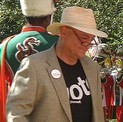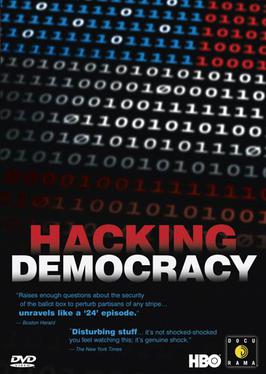Premier Election Solutions, formerly Diebold Election Systems, Inc. (DESI), was a subsidiary of Diebold that made and sold voting machines.
Bev Harris is an American writer, activist, and founder of Black Box Voting, a national, nonpartisan elections watchdog group. She helped popularize the term "black box voting", while authoring a book of that title.
The Volusia error is an example of the problems with electronic voting from the 2000 US presidential election.

Ion Voltaire Sancho was an elected official who served Leon County, Florida, as Supervisor of Elections for 28 years, from 1989 to 2017. During his time in office, he was admired for his integrity as a voter advocate and elections expert, and became nationally known for his role in the Florida presidential election recount of 2000. He was also known for his appearance in the 2006 investigative documentary Hacking Democracy.

Hacking Democracy is a 2006 Emmy nominated documentary film broadcast on HBO and created by producer / directors Russell Michaels and Simon Ardizzone, with producer Robert Carrillo Cohen, and executive producers Sarah Teale, Sian Edwards & Earl Katz. Filmed over three years it documents American citizens investigating anomalies and irregularities with 'e-voting' systems that occurred during the 2000 and 2004 elections in the United States, especially in Volusia County, Florida. The film investigates the flawed integrity of electronic voting machines, particularly those made by Diebold Election Systems, exposing previously unknown backdoors in the Diebold trade secret computer software. The film culminates dramatically in the on-camera hacking of the in-use / working Diebold election system in Leon County, Florida - the same computer voting system which has been used in actual American elections across thirty-three states, and which still counts tens of millions of America's votes today.

Jeff Moss, also known as Dark Tangent, is an American hacker, computer and internet security expert who founded the Black Hat and DEF CON computer security conferences.
Dr. Herbert Hugh Thompson is a computer security expert, an Adjunct Professor in the Computer Science Department at Columbia University, and the Chief Technology Officer of Symantec. He is also the Program Chairman of RSA Conference the world's largest information security conference with over 25,000 attendees annually. Thompson is the co-author of a book on human achievement titled The Plateau Effect: Getting from Stuck to Success published by Penguin in 2013 and has co-authored three books on information security including, How to Break Software Security: Effective Techniques for Security Testing published by Addison-Wesley, and The Software Vulnerability Guide published by Charles River 2005. He is perhaps best known for his role in exposing electronic voting machine vulnerabilities as part of the HBO Documentary Hacking Democracy. He was named one of the "Top 5 Most Influential Thinkers in IT Security" by SC Magazine and has been referred to by the Financial Times as "One of the world’s foremost cryptology and internet security experts."
The Hursti Hack was a successful attempt to alter the votes recorded on a Diebold optical scan voting machine. The hack is named after Harri Hursti.
Cyberwarfare by Russia includes denial of service attacks, hacker attacks, dissemination of disinformation and propaganda, participation of state-sponsored teams in political blogs, internet surveillance using SORM technology, persecution of cyber-dissidents and other active measures. According to investigative journalist Andrei Soldatov, some of these activities were coordinated by the Russian signals intelligence, which was part of the FSB and formerly a part of the 16th KGB department. An analysis by the Defense Intelligence Agency in 2017 outlines Russia's view of "Information Countermeasures" or IPb as "strategically decisive and critically important to control its domestic populace and influence adversary states", dividing 'Information Countermeasures' into two categories of "Informational-Technical" and "Informational-Psychological" groups. The former encompasses network operations relating to defense, attack, and exploitation and the latter to "attempts to change people's behavior or beliefs in favor of Russian governmental objectives."
Simon Nicholas Knight Ardizzone is an editor and filmmaker. He produced and co-directed the documentary Hacking Democracy with Russell Michaels (2006) and co-directed Kill Chain: The Cyber War on America's Elections (2020) with Russell Michaels and Sarah Teale. He was an editor on the TV documentaries: God Is Green (2007); Britain's Greatest Monarch (2005); and What Made Mozart Tic (2004).

Robert Zeidman is an American electrical engineer and inventor. He rose to national attention in the USA after a private arbitration panel in April, 2023 ruled that Zeidman had proved material provided by Mike Lindell was not data from the 2020 presidential election. As such it could not be evidence of Chinese electoral interference.

Michael James Lindell, also known as the My Pillow Guy, is an American businessman, political activist, and conspiracy theorist. He is the founder and CEO of My Pillow, a pillow, bedding, and slipper manufacturing company.
Election cybersecurity or election security refers to the protection of elections and voting infrastructure from cyberattack or cyber threat – including the tampering with or infiltration of voting machines and equipment, election office networks and practices, and voter registration databases.
Robert J. Sutherland is a former American politician previously serving as a member of the Washington House of Representatives for the 39th district.

Kill Chain: The Cyber War on America's Elections is an American television documentary film produced by Ish Entertainment, Blumhouse Productions and HBO Films. The film examines the American election system and its vulnerabilities to foreign cyberwarfare operations and 2020 presidential election interference. The film also features hackers at the conference DEF CON in their attempts to test the security of electronic voting machines.

Absolute Proof is a 2021 political propaganda film directed by and starring Mike Lindell. It was distributed by One America News Network and promotes the conspiracy theory that Donald Trump won the 2020 presidential election instead of Joe Biden. The documentary was removed by video hosting sites YouTube and Vimeo for violating their community standards.

The 2021 Maricopa County presidential ballot audit, commonly referred to as the Arizona audit, was an examination of ballots cast in Maricopa County during the 2020 United States presidential election in Arizona initiated by Republicans in the Arizona State Senate and executed by private firms. Begun in April 2021, the audit stirred controversy due to extensive previous efforts by Trump and his allies to overturn the election and due to assertions of rule violations and irregularities in the conduct of the recount, leading to claims that the audit was essentially a disinformation campaign. In June 2021, Maggie Haberman of The New York Times and Charles Cooke of National Review reported Trump had told associates that based on the results of the audit, he would be reinstated as president in August 2021. By early August, no evidence of widespread fraud had surfaced.

Donie O'Sullivan is an Irish journalist working for CNN in New York.
Sarah Teale is a British-American documentary film producer and director, known for her Emmy nominated HBO documentaries Hacking Democracy, Dealing Dogs, The Weight of the Nation and Kill Chain: The Cyber War on America’s Elections.









